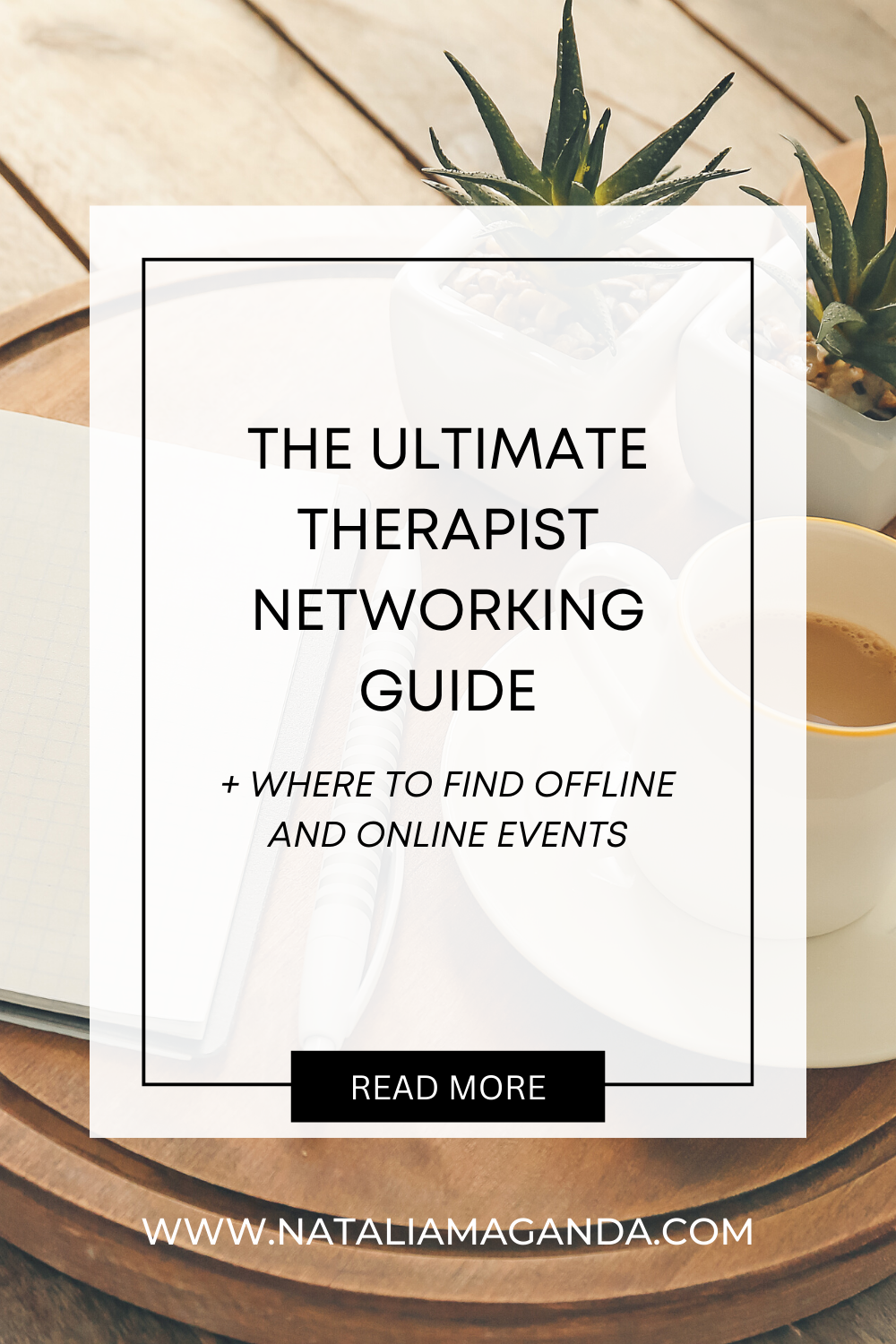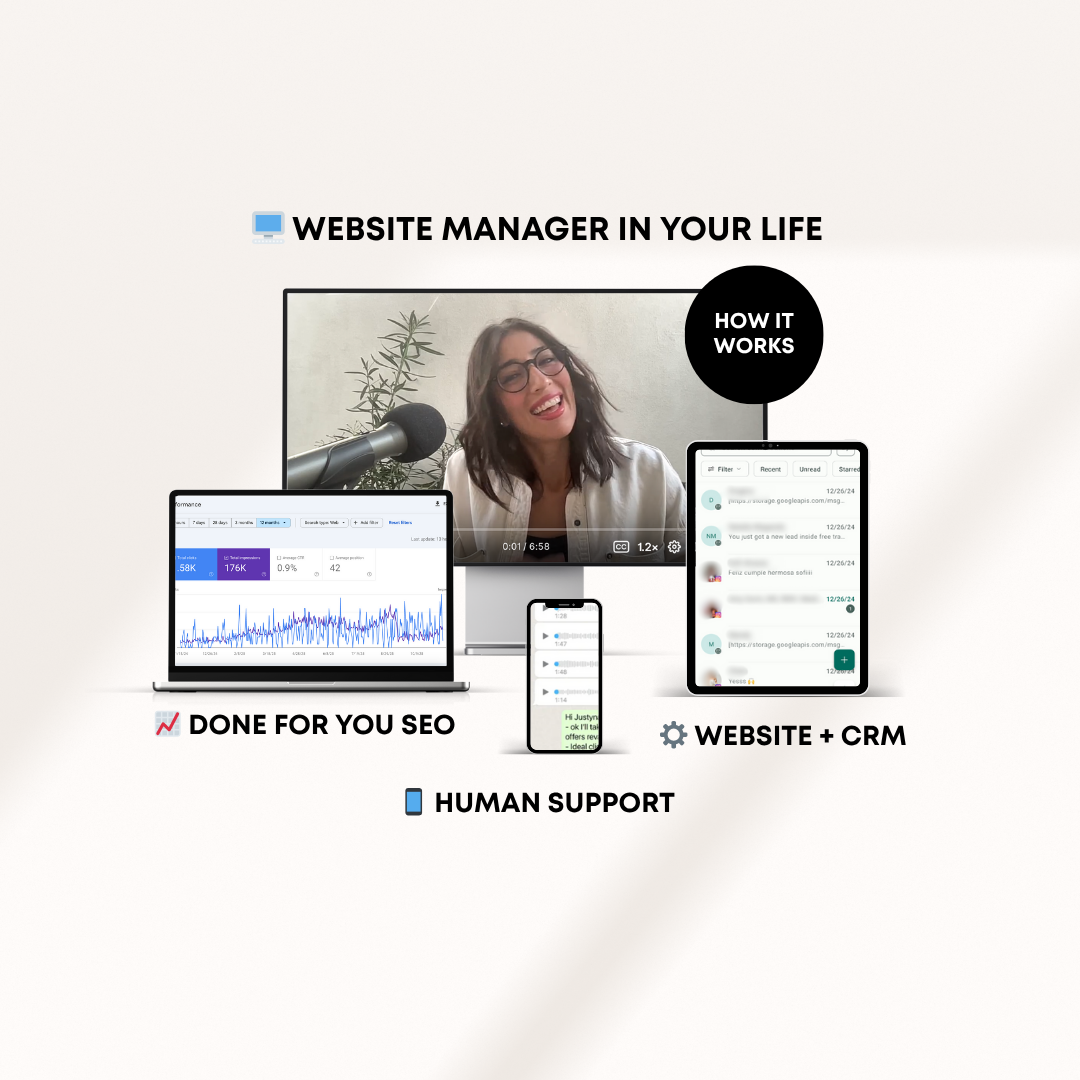Therapist networking tips and where to find online events
Starting your own private practice is an exciting journey, but it can also feel a bit overwhelming, right? Networking is one of the best ways to grow your practice, gain referrals, and build a supportive community. Today, we’ll dive into some top networking tips and show you where to find both in-person and online networking events.
In case we haven’t met yet, I’m Natalia Maganda, a website designer for therapists . I help ambitious therapists and mental health professionals amplify their magic, gain visibility, and simplify their marketing efforts through strategic web design and content.
Networking can be a game-changer for your private practice. Whether you’re just starting or looking to expand, connecting with other professionals in your field can open up new opportunities and provide much-needed support. In this post, we'll explore why networking is so important, share strategies to help you make meaningful connections, and point you to where you can find these valuable networking events. Ready to dive in? Let’s go!
The importance of networking for therapists
Networking is more than just exchanging business cards; it’s about building relationships, sharing knowledge, and supporting each other in your professional journeys. Here’s why networking is essential for therapists:
- It helps you build a supportive community: Connect with other therapists who understand the unique challenges and rewards of the profession.
- You’ll gain a ton of referrals: Networking can lead to valuable referrals from colleagues who trust your expertise.
- Stay in the know and informed: It’ll help you stay up-to-date with the latest trends, techniques, and research in the field.
- Professional Growth: Learn from the experiences and insights of others, and find opportunities for collaboration and continuing education.
Where can I find therapist networking events in the USA?
Offline
American Psychological Association (APA) Events
- The APA hosts various conferences and events throughout the year. These gatherings are perfect for networking with other psychologists and mental health professionals.APA Events
National Association of Social Workers (NASW) Conferences
- NASW offers numerous events for social workers to connect, learn, and grow. Check out their conference schedule for upcoming opportunities. NASW Conferences
State and Local Associations
- Many states have their own psychological or counseling associations that host local events. These smaller gatherings can be excellent for building local connections.
Online
Therapy Reimagined Conference
- This online conference is designed to bring together modern therapists who are looking to redefine the field. It’s a fantastic opportunity to network and learn.Therapy Reimagined
GoodTherapy Webinars
- GoodTherapy hosts a variety of webinars on different topics relevant to therapists. These can be great for both learning and networking. GoodTherapy Webinars
TeleTherapist Network
- This platform offers a space for telehealth professionals to connect and share resources.TeleTherapist Network
These gatherings are perfect for networking with other psychologists and mental health professionals.
*This post contains sponsored links.

10 Therapist networking strategies to help you build a strong referral network
- Attend conferences and workshops: Make the most of industry events by actively engaging with other attendees.
- Join professional associations: Become a member of organizations like the APA or NASW to access networking opportunities.
- Participate in online forums and groups: Engage in discussions on platforms like LinkedIn, Reddit, or specialized forums.
- Host workshops or webinars of your own: Position yourself as an expert by sharing your knowledge and inviting others to connect.
- Volunteer: Get involved in community events or professional organizations to meet like-minded professionals.
- Collaborate on projects: Partner with colleagues on research, workshops, or community projects.
- Follow up and send virtual coffees or gifts to your referrals: After meeting someone, send a follow-up email to reinforce the connection and explore potential collaborations.
- Use social media: Leverage platforms like LinkedIn and Twitter to connect with peers and share your insights.
- Join local meetups: Look for local therapist groups or meetups in your area to build connections close to home.
- Offer to mentor: Providing mentorship to newer therapists can build strong, lasting professional relationships.
Want to plan your website so that you can stand out in your networking events?
Having a website is crucial for making a lasting impression at networking events. A well-crafted website showcases your services, personality, and expertise, making it easier for potential clients and colleagues to connect with you.
If you’re ready to take your online presence to the next level, I have an amazing website planning toolkit that guides you through everything you need to consider for planning and writing your website strategy and website copy.
This toolkit will help you truly speak to people’s emotions and showcase your human essence. Inside, you’ll learn the exact strategy your mental health website needs to get daily leads and how to add personality to your words to connect better with your ideal clients.
Networking is a powerful tool for growing your private practice and building a supportive professional community.
By attending both in-person and online events, you can expand your network, gain referrals, and stay informed about industry trends. If you need help standing out with a professional website, explore my web design services for therapists . Let’s work together to amplify your impact and simplify your marketing efforts.
Related reads:
- The ultimate guide to branding your therapy and private practice
- 10 simple ways to get more therapy clients for your private practice
20 modern therapist logo ideas - How to write an engaging Psychology Today profile
- SimplePractice vs TherapyNotes in-depth comparison
- Blogging basics for therapists and 140 blog post ideas

* AI Disclosure: This content may contain sections generated with AI with the purpose of providing you with condensed helpful and relevant content, however all personal opinions are 100% human made as well as the blog post structure, outline and key takeaways.
* Affiliate Disclosure: Some of the links on www.nataliamaganda.com may contain affiliate links meaning that I will get a commission for recommending products at no extra cost to you.

hello! i'm natalia
Latina, web design expert for mental health professionals.
I help ambitious life coaches, therapists and holistic leaders amplify their magic, gain visibility, and simplify their marketing efforts through strategic web design and content.
If you’re looking for an all-in-one system to manage your website, emails, funnels, and CRM, Go HighLevel (affiliate link) is the most powerful tool I’ve tested—and it’s built to grow with you.
On a tighter budget or just starting out? ThriveCart (affiliate link) offers a one-time payment option and easy checkout setups that still pack a punch for digital offers and automation. (Send me an email after your purchase and make sure to use my affiliate link)






